高中英语 北师大版 必修五 Unit 14 Careers Lesson 3 Nine to Five 课件(40张)
文档属性
| 名称 | 高中英语 北师大版 必修五 Unit 14 Careers Lesson 3 Nine to Five 课件(40张) |
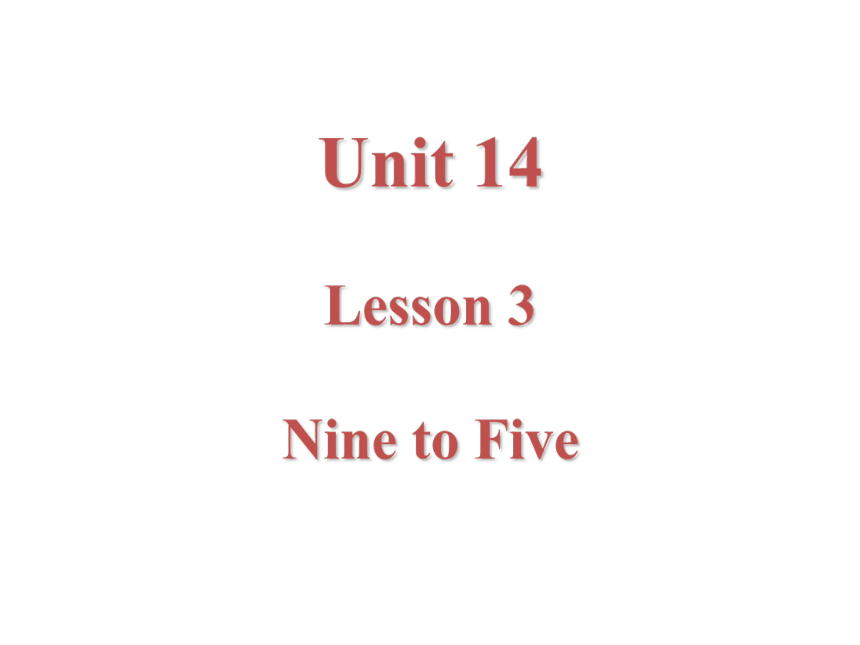
|
|
| 格式 | zip | ||
| 文件大小 | 399.6KB | ||
| 资源类型 | 教案 | ||
| 版本资源 | 北师大版 | ||
| 科目 | 英语 | ||
| 更新时间 | 2016-08-29 07:48:16 | ||
图片预览

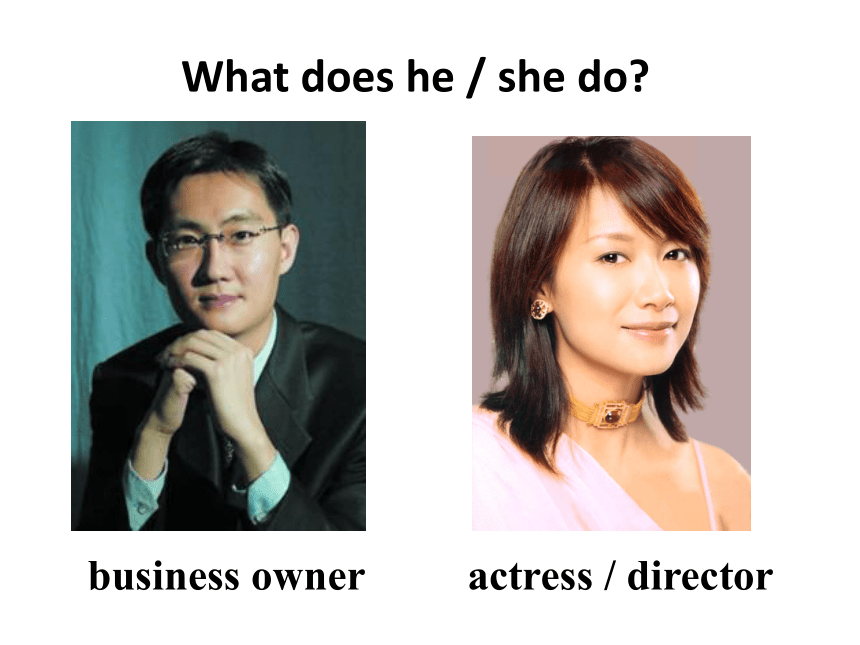
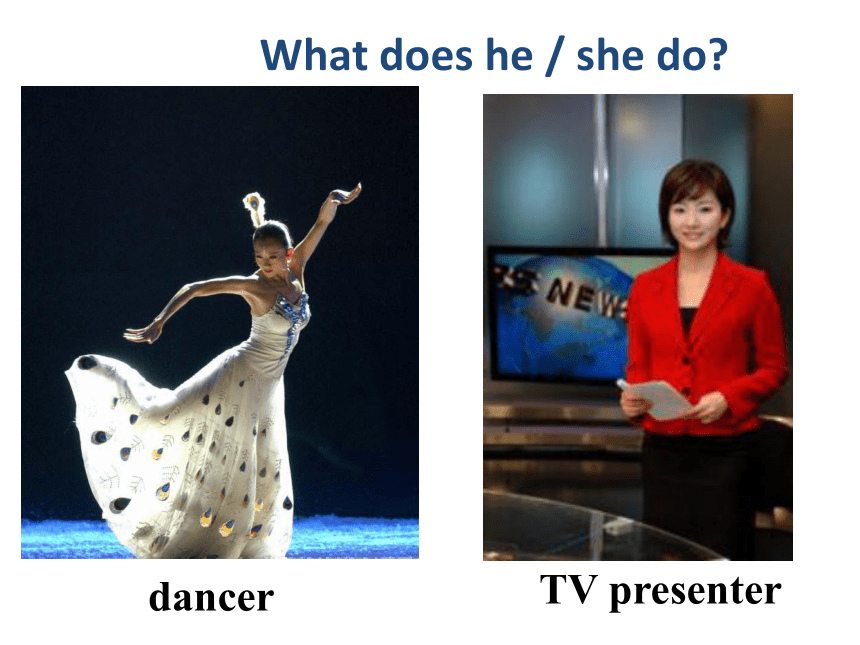
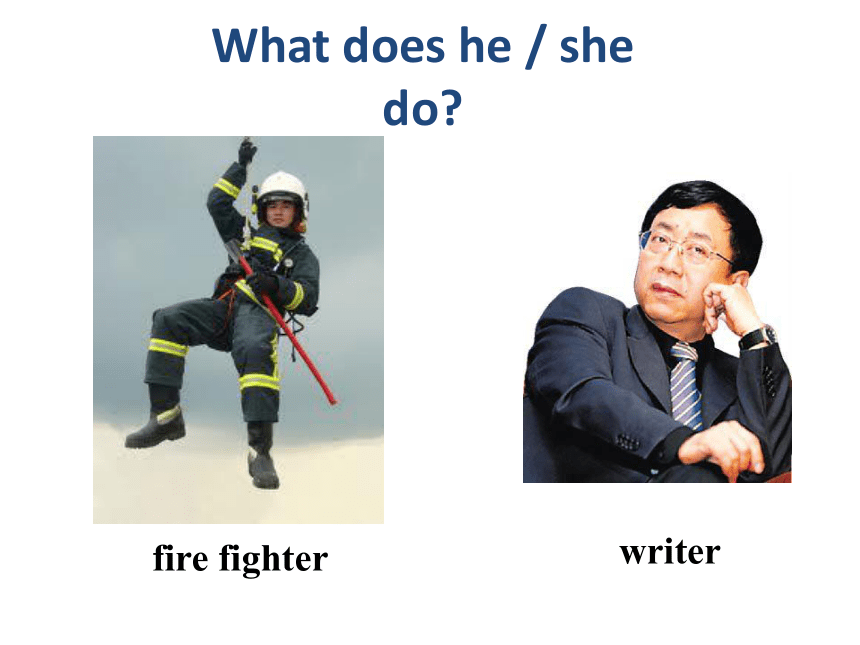
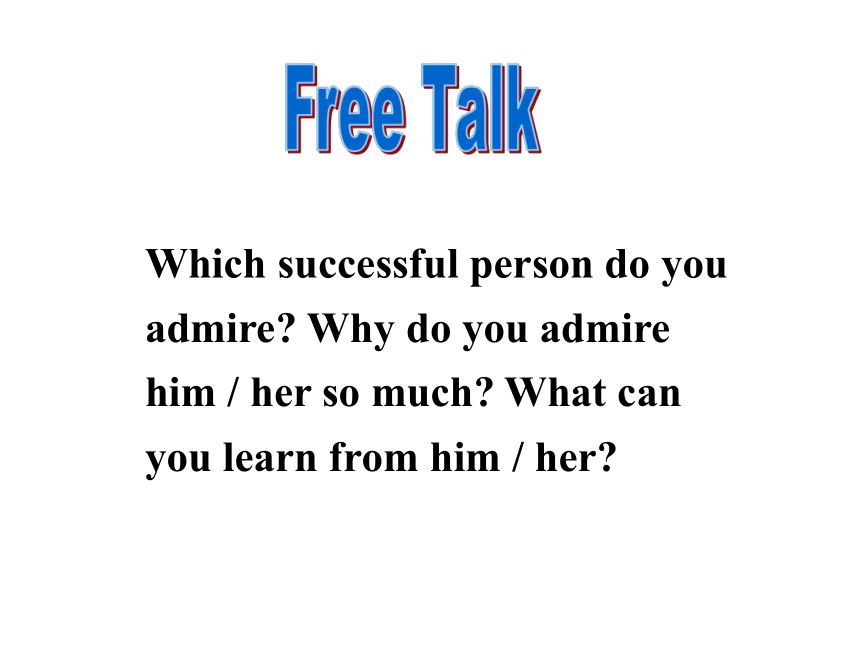
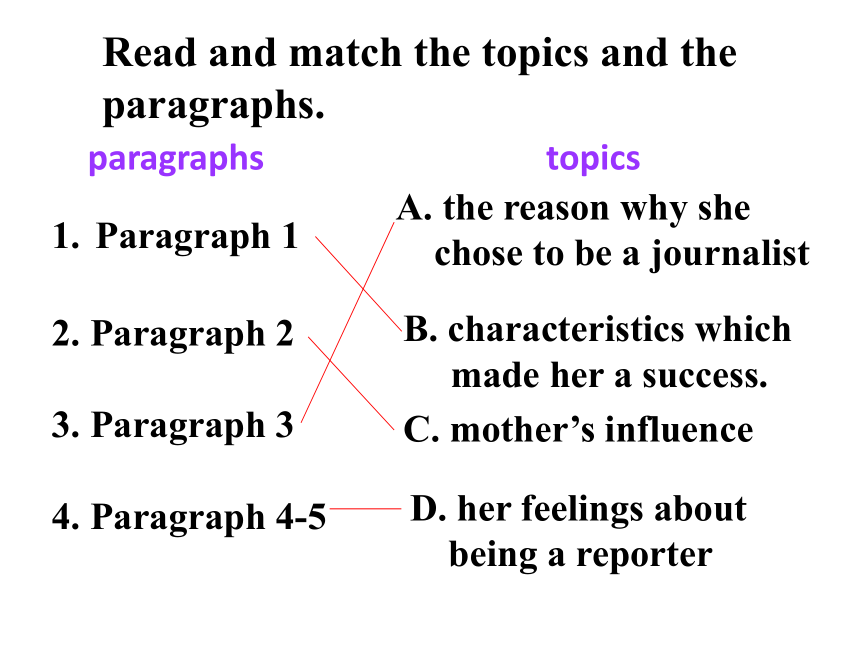
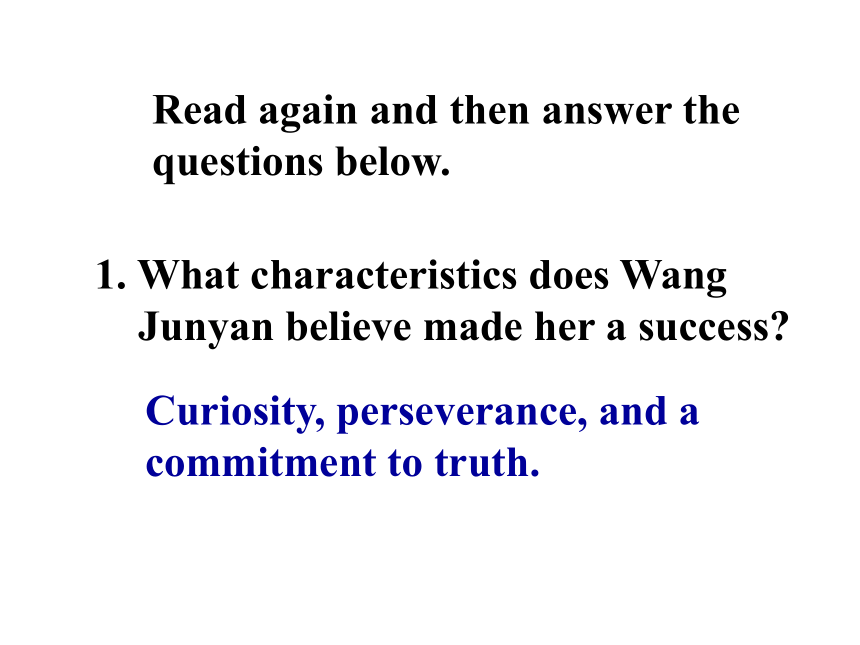
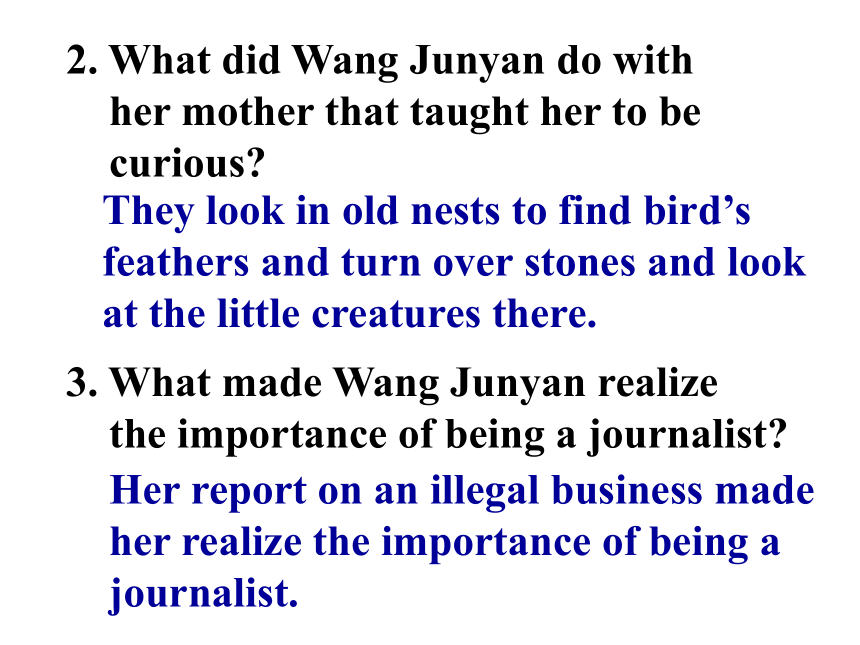
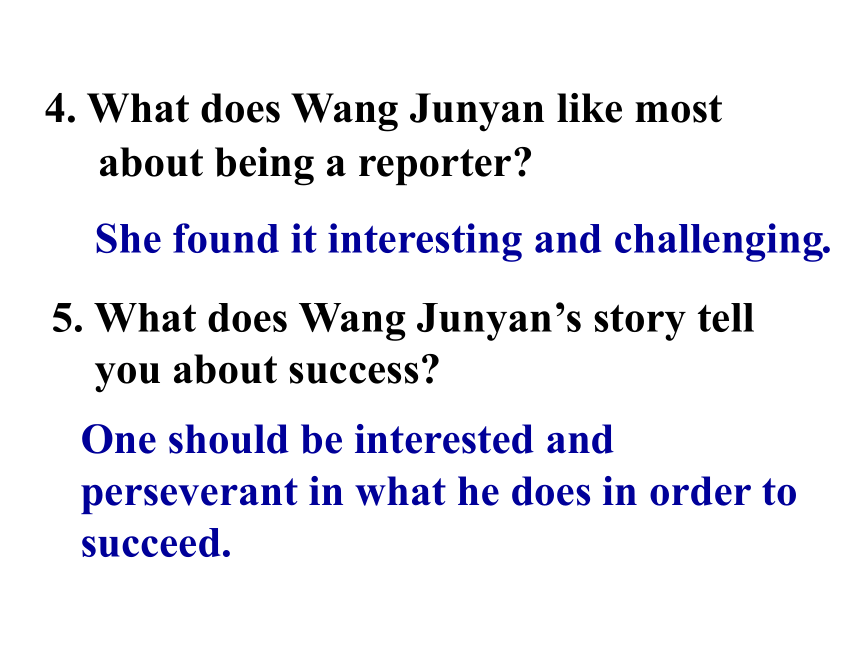
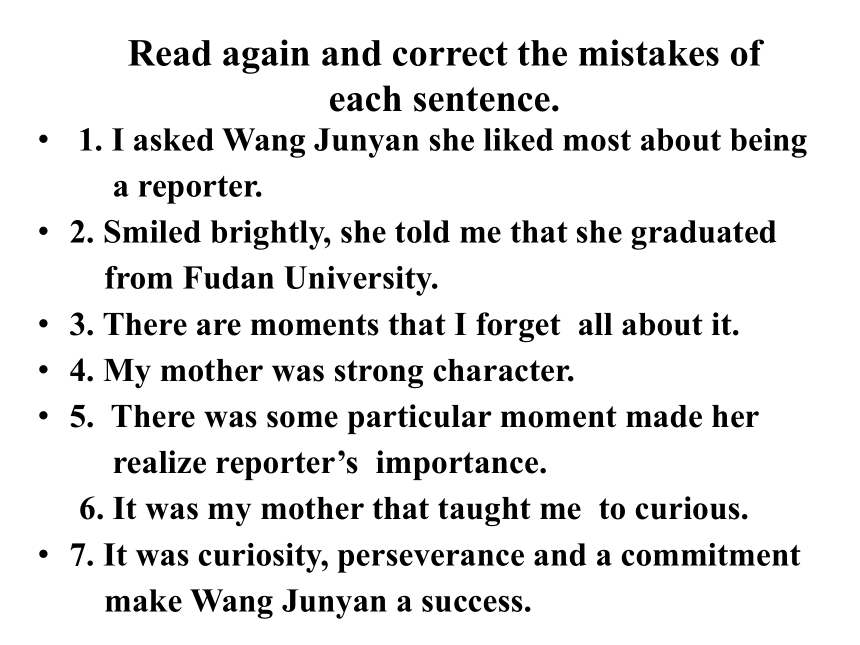
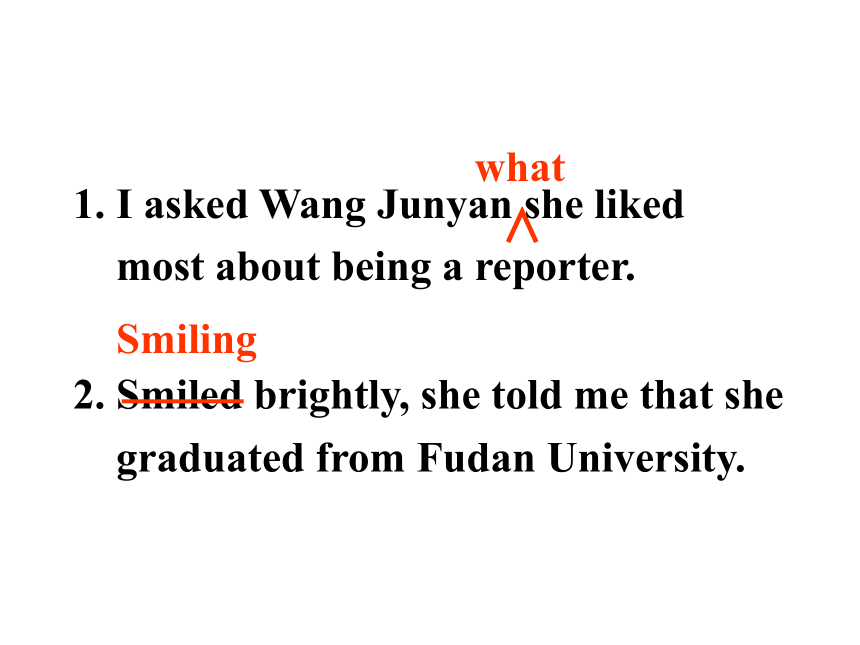
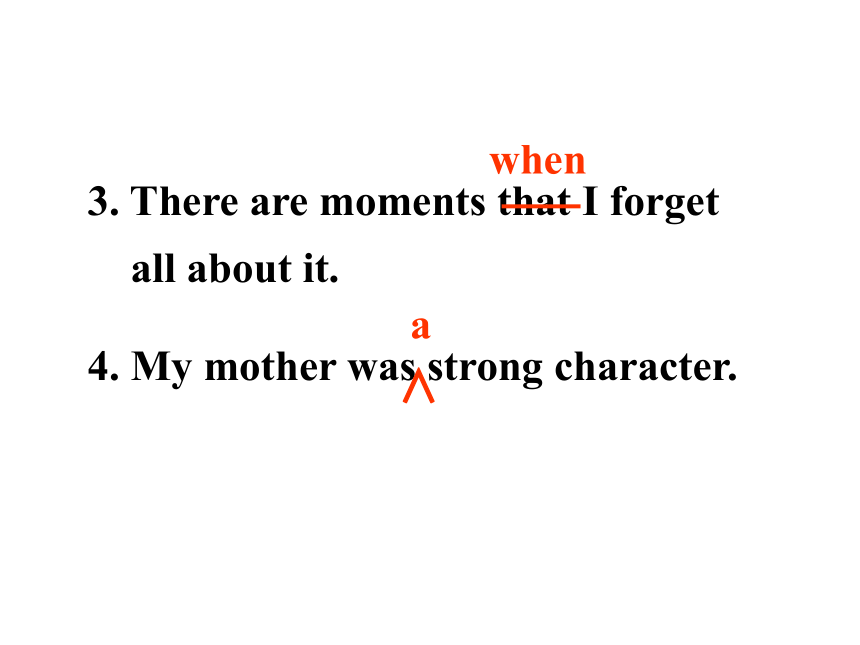
文档简介
课件40张PPT。Unit 14
Lesson 3
Nine to FiveWhat does he / she do?business owneractress / directordancer TV presenterWhat does he / she do?fire fighterWhat does he / she do?writerWhich successful person do you admire? Why do you admire him / her so much? What can you learn from him / her?Free TalkRead and match the topics and the paragraphs.Paragraph 1
2. Paragraph 2
3. Paragraph 3
4. Paragraph 4-5 the reason why she
chose to be a journalistB. characteristics which
made her a success.C. mother’s influenceD. her feelings about
being a reportertopicsparagraphsRead again and then answer the questions below.1. What characteristics does Wang Junyan believe made her a success?Curiosity, perseverance, and a commitment to truth.2. What did Wang Junyan do with
her mother that taught her to be
curious?3. What made Wang Junyan realize
the importance of being a journalist?They look in old nests to find bird’s feathers and turn over stones and look at the little creatures there.Her report on an illegal business made her realize the importance of being a journalist.4. What does Wang Junyan like most
about being a reporter?5. What does Wang Junyan’s story tell
you about success?She found it interesting and challenging.One should be interested and perseverant in what he does in order to succeed. Read again and correct the mistakes of each sentence. 1. I asked Wang Junyan she liked most about being
a reporter.
2. Smiled brightly, she told me that she graduated
from Fudan University.
3. There are moments that I forget all about it.
4. My mother was strong character.
5. There was some particular moment made her
realize reporter’s importance.
6. It was my mother that taught me to curious.
7. It was curiosity, perseverance and a commitment
make Wang Junyan a success. I asked Wang Junyan she liked
most about being a reporter.2. Smiled brightly, she told me that she
graduated from Fudan University.whatSmiling∧3. There are moments that I forget
all about it.4. My mother was strong character.whena∧5. There was some particular moment
made her realize reporter’s
importance. 6. It was my mother that taught me
to curious.thatbe∧∧7. It was curiosity, perseverance and
a commitment make Wang
Junyan a success.thatwhichDiscussionWhy has Wang Junyan become a successful TV presenter? What can you learn from her?Wang Junyan is a __________ now. She said that it is _______, ___________, and ______________ that made her success. It is _______ who taught her to be curious. After graduating from university, Wang became a ______. Her report ______ people and it also helped the government ______ the company and catch the _____________. Her perseverance _________ when she won an award for the report.
She also said that as a reporter she needed many ___________ and kept ______ new things. She still felt ________ now .TV presentercuriosityperseverancecommitment to truthher motherreporterhelpedinspectthe guilty peoplepaid offdifferent skillslearningcuriousSum up the main idea.Language points … and she told me that being curious,
working hard, and believing in what was true made her the success she is today.动名词being curious, working hard, and
believing in what was true在句中作主语。 believe in 相信;信仰
We believe in him.
Christians believe in Jesus.
I believe in Marxism.believe, believe in这一对词语都表示“相信不疑”的意思,但词意有细微的区别。
believe: 表示“相信、信以为真之意,它是及物动词,其后直接跟宾语。
?
I believe it to have been a mistake.
believe in: 则表示“信仰、信任之意,是一个动介型短语动词,其后的常用搭配语为:有关宗教、理论、原则、概念及可信任之人,如:a religion, ghosts, fairies, a theory, a friend等词。
?
I believe in you. 2. It was my mother who taught me to be
curious. 这是一个强调句。It引导的强调句结构是:It + is/was +强调部分 + that (who) +句子其余部分,it在句中无意义。这种强调句由普通陈述句转换而来,用来强调句子的主语、宾语或状语。原句:Karl bought?Mary?a?bicycle?on her
?? birthday.?
1. It?was?Karl?that/who?bought?Mary?a?bicycle?
on?her?birthday.(强调主语)?
2.It?was?Mary?for?whom?Karl?bought?a?bicycle? on?her?birthday.(强调间接宾语)?
3. It?was?a?bicycle?that?Karl?bought?Mary?on?
her?birthday.(强调直接宾语)?
4. It?was?on?her?birthday?that?Karl?bought?
Mary?a?bicycle.(强调状语) 3. … and we would even turn over stones
to look at the little creatures there.turn over 翻过来,翻身,移交
The car was turned over and the driver got seriously injured.
If you turn over you might find it easier to get to sleep.
I had turn over my essay to the professor.
He turned the business over to his daughter.turn的常用短语:
turn out 结果是;证明是
turn up 出现,发生,调大
turn down 拒绝,调低,关小
turn on 打开,拧开
turn around 转身
turn to 求助于,转向
turn off 关掉
turn in 上缴,交还
turn into 变成4. Although there were lots of difficulties to
overcome, she never … overcome v. 战胜;克服;(感情等)压倒
The learner of a second language has many obstacles to overcome.
He was overcome with astonishment.
After she’d overcome her initial shyness, she became very friendly.conquer, overcome, defeat, beat这些动词均含“征服,战胜”之意。
conquer: 侧重战胜和控制。书面用词。
?
When will scientist conquer cancer?
overcome: 多指战胜或克服非物质的东西,如困难和不良习惯等。语气较弱也可指在斗争或竞争中战胜或压倒对方。
Can you overcome your shortcomings? defeat: 普通用词,多指在战争、比赛、竞选或辩论中战胜对手,侧重胜利的暂时性。
I believe nothing can defeat you.
beat: 口笔语均可用,可与defeat换用。
If we don't prepare for the speech contest, they will beat us.
5. … because it is important that people
grasp what is going on around them. grasp v.领会,抓住,紧握
I grasped the main point of the speech.
She never could grasp how to do it.
He grasped the cat by the back of its neck.
You must grasp this opportunity.
The little girl grasped her mother’s arm. understand, comprehend, appreciate, grasp这些动词均有“理解”之意。
understand: 一般用词,很常用,指对事实或意义知道得很清楚。
??
I don't understand what you are saying.
comprehend: 较正式用词,指对较复杂的事物能透彻理解其意义。
?
I cannot comprehend this phrase.appreciate: 欣赏,指对某事物或意义有正确的认识,对其价值的肯定。
I've decided to learn photography in order that I may better appreciate the beauty of nature.
grasp: 从本义抓紧、抓住,引申作“理解、掌握”。
I grasped the main point of the speech. take, grasp, grab, grip, snatch, seize这些动词均有“抓住,握紧”之意。
take: 最普通用词,不带感彩。指用手抓、取某东西或控制某物。
Take money from the bank when needed.
grasp: 指紧紧抓住、抓牢。
With your other hand, grasp your wrist.
grab:指粗暴而急迫的抓住。 He grabbed my collar and pulled me towards him. grip:语气比grasp强,指用手的最大力量紧紧抓住。
The frightened child gripped his mother's arm.
snatch: 指突然抢走,侧重动作更快或更具暴力性质。
The hawk snatched the chicken and flew away.
seize: 指突然抓住某物,强调突然的猛烈动作。
They seize the drugs and arrest the people on the boats.
6. …and she replied that it was after she
was asked to inspect an illegal business.inspect v. 仔细检查;视察
They inspected the roof for leaks.
Police were called out to keep at the airport and inspect the arriving planes.
Health Department officials came to inspect the factory. examine, inspect, investigate和scan这些动词都有“调查、检查”之意。
examine: 最普通用词,可指粗略地查看,也可指仔细观察或调查以确定事物的性质、功能、特点等。
Examine the account well before you pay it.
inspect: 侧重按一定质量标准检查某物,找出不足或不同之处。
Customs officers inspect our baggage. investigate: 指为发现事实真相或了解掌握情况而进行深入细致的现场考察。
The company hired a detective to investigate the accident.
scan: 原义是仔细地检查分析,现用于指细看或浏览。
She scanned his face, looking for signs of what he was thinking. 7. This paid off because she won an award
for the report.pay off 取得成功;得到好结果; 清偿债务
Two years of business school really paid off. Did his plan pay off?
It took them three years to pay off the debt.pay a visit 进行访问 pay for 偿还,付款
pay attention to 注意/留意…
pay back 偿还,回报,报复 8. I discovered then that as long as I am
committed and never give up I will …commit v. 投入;把...交托给;使承担义务;
犯(罪),做(错事等)
The company committed most of its profits to building new factories.
The child was committed to the nurse's care.
I asked her what she thought, but she refused to commit herself.
I committed an error in handling the business. 9. … I’m turning over stones to see what
might be hiding beneath!beneath adv. 在底下;在下方
As we flew over the mountains we could see that there were snowy peaks beneath.
Her careful make-up hid the signs of age beneath.below, beneath, under这些前置词均可表示位置“在……下面”之意。
below: 指位置低于某物或在某物下方,但不一定在正下方,所指范围较宽。
Please do not write below this line.
beneath: 书面用词,指紧挨……之下,其反义词是on。
The earth lay beneath a blanket of snow.
under: 普通用词,与over相对,指在某物的正下方,含垂直在下的意思。
She sat very still under the tree. No problem is too difficult to o______, as long as you work hard and never give up.
2. My English is poor, and sometimes I can’t g_______ what the foreign teacher says.
3. In that city, a lot of people c________ ?murders every year.
5. After graduating from j______ middle
school, he entered senior middle
school.overcome grasp /getcommit junior 请根据首字母或汉语意思提示完成下列句子。 6. In many countries, it’s _______ (违法 ???? 的) to drive if you are drunk.
7. The scientist has a new idea of how the ???? _______ (宇宙) began.
8. Every Monday morning, our teacher ???? walks around to _________ (检查) our ???? homework.
9. Which bridge would you say is the ???? most famous in _______ (存在) today? illegal universe inspect /checkexistence Review the words and expressions
in the text.
2. Finish Ex 4-6 on Pages 70-71.
Lesson 3
Nine to FiveWhat does he / she do?business owneractress / directordancer TV presenterWhat does he / she do?fire fighterWhat does he / she do?writerWhich successful person do you admire? Why do you admire him / her so much? What can you learn from him / her?Free TalkRead and match the topics and the paragraphs.Paragraph 1
2. Paragraph 2
3. Paragraph 3
4. Paragraph 4-5 the reason why she
chose to be a journalistB. characteristics which
made her a success.C. mother’s influenceD. her feelings about
being a reportertopicsparagraphsRead again and then answer the questions below.1. What characteristics does Wang Junyan believe made her a success?Curiosity, perseverance, and a commitment to truth.2. What did Wang Junyan do with
her mother that taught her to be
curious?3. What made Wang Junyan realize
the importance of being a journalist?They look in old nests to find bird’s feathers and turn over stones and look at the little creatures there.Her report on an illegal business made her realize the importance of being a journalist.4. What does Wang Junyan like most
about being a reporter?5. What does Wang Junyan’s story tell
you about success?She found it interesting and challenging.One should be interested and perseverant in what he does in order to succeed. Read again and correct the mistakes of each sentence. 1. I asked Wang Junyan she liked most about being
a reporter.
2. Smiled brightly, she told me that she graduated
from Fudan University.
3. There are moments that I forget all about it.
4. My mother was strong character.
5. There was some particular moment made her
realize reporter’s importance.
6. It was my mother that taught me to curious.
7. It was curiosity, perseverance and a commitment
make Wang Junyan a success. I asked Wang Junyan she liked
most about being a reporter.2. Smiled brightly, she told me that she
graduated from Fudan University.whatSmiling∧3. There are moments that I forget
all about it.4. My mother was strong character.whena∧5. There was some particular moment
made her realize reporter’s
importance. 6. It was my mother that taught me
to curious.thatbe∧∧7. It was curiosity, perseverance and
a commitment make Wang
Junyan a success.thatwhichDiscussionWhy has Wang Junyan become a successful TV presenter? What can you learn from her?Wang Junyan is a __________ now. She said that it is _______, ___________, and ______________ that made her success. It is _______ who taught her to be curious. After graduating from university, Wang became a ______. Her report ______ people and it also helped the government ______ the company and catch the _____________. Her perseverance _________ when she won an award for the report.
She also said that as a reporter she needed many ___________ and kept ______ new things. She still felt ________ now .TV presentercuriosityperseverancecommitment to truthher motherreporterhelpedinspectthe guilty peoplepaid offdifferent skillslearningcuriousSum up the main idea.Language points … and she told me that being curious,
working hard, and believing in what was true made her the success she is today.动名词being curious, working hard, and
believing in what was true在句中作主语。 believe in 相信;信仰
We believe in him.
Christians believe in Jesus.
I believe in Marxism.believe, believe in这一对词语都表示“相信不疑”的意思,但词意有细微的区别。
believe: 表示“相信、信以为真之意,它是及物动词,其后直接跟宾语。
?
I believe it to have been a mistake.
believe in: 则表示“信仰、信任之意,是一个动介型短语动词,其后的常用搭配语为:有关宗教、理论、原则、概念及可信任之人,如:a religion, ghosts, fairies, a theory, a friend等词。
?
I believe in you. 2. It was my mother who taught me to be
curious. 这是一个强调句。It引导的强调句结构是:It + is/was +强调部分 + that (who) +句子其余部分,it在句中无意义。这种强调句由普通陈述句转换而来,用来强调句子的主语、宾语或状语。原句:Karl bought?Mary?a?bicycle?on her
?? birthday.?
1. It?was?Karl?that/who?bought?Mary?a?bicycle?
on?her?birthday.(强调主语)?
2.It?was?Mary?for?whom?Karl?bought?a?bicycle? on?her?birthday.(强调间接宾语)?
3. It?was?a?bicycle?that?Karl?bought?Mary?on?
her?birthday.(强调直接宾语)?
4. It?was?on?her?birthday?that?Karl?bought?
Mary?a?bicycle.(强调状语) 3. … and we would even turn over stones
to look at the little creatures there.turn over 翻过来,翻身,移交
The car was turned over and the driver got seriously injured.
If you turn over you might find it easier to get to sleep.
I had turn over my essay to the professor.
He turned the business over to his daughter.turn的常用短语:
turn out 结果是;证明是
turn up 出现,发生,调大
turn down 拒绝,调低,关小
turn on 打开,拧开
turn around 转身
turn to 求助于,转向
turn off 关掉
turn in 上缴,交还
turn into 变成4. Although there were lots of difficulties to
overcome, she never … overcome v. 战胜;克服;(感情等)压倒
The learner of a second language has many obstacles to overcome.
He was overcome with astonishment.
After she’d overcome her initial shyness, she became very friendly.conquer, overcome, defeat, beat这些动词均含“征服,战胜”之意。
conquer: 侧重战胜和控制。书面用词。
?
When will scientist conquer cancer?
overcome: 多指战胜或克服非物质的东西,如困难和不良习惯等。语气较弱也可指在斗争或竞争中战胜或压倒对方。
Can you overcome your shortcomings? defeat: 普通用词,多指在战争、比赛、竞选或辩论中战胜对手,侧重胜利的暂时性。
I believe nothing can defeat you.
beat: 口笔语均可用,可与defeat换用。
If we don't prepare for the speech contest, they will beat us.
5. … because it is important that people
grasp what is going on around them. grasp v.领会,抓住,紧握
I grasped the main point of the speech.
She never could grasp how to do it.
He grasped the cat by the back of its neck.
You must grasp this opportunity.
The little girl grasped her mother’s arm. understand, comprehend, appreciate, grasp这些动词均有“理解”之意。
understand: 一般用词,很常用,指对事实或意义知道得很清楚。
??
I don't understand what you are saying.
comprehend: 较正式用词,指对较复杂的事物能透彻理解其意义。
?
I cannot comprehend this phrase.appreciate: 欣赏,指对某事物或意义有正确的认识,对其价值的肯定。
I've decided to learn photography in order that I may better appreciate the beauty of nature.
grasp: 从本义抓紧、抓住,引申作“理解、掌握”。
I grasped the main point of the speech. take, grasp, grab, grip, snatch, seize这些动词均有“抓住,握紧”之意。
take: 最普通用词,不带感彩。指用手抓、取某东西或控制某物。
Take money from the bank when needed.
grasp: 指紧紧抓住、抓牢。
With your other hand, grasp your wrist.
grab:指粗暴而急迫的抓住。 He grabbed my collar and pulled me towards him. grip:语气比grasp强,指用手的最大力量紧紧抓住。
The frightened child gripped his mother's arm.
snatch: 指突然抢走,侧重动作更快或更具暴力性质。
The hawk snatched the chicken and flew away.
seize: 指突然抓住某物,强调突然的猛烈动作。
They seize the drugs and arrest the people on the boats.
6. …and she replied that it was after she
was asked to inspect an illegal business.inspect v. 仔细检查;视察
They inspected the roof for leaks.
Police were called out to keep at the airport and inspect the arriving planes.
Health Department officials came to inspect the factory. examine, inspect, investigate和scan这些动词都有“调查、检查”之意。
examine: 最普通用词,可指粗略地查看,也可指仔细观察或调查以确定事物的性质、功能、特点等。
Examine the account well before you pay it.
inspect: 侧重按一定质量标准检查某物,找出不足或不同之处。
Customs officers inspect our baggage. investigate: 指为发现事实真相或了解掌握情况而进行深入细致的现场考察。
The company hired a detective to investigate the accident.
scan: 原义是仔细地检查分析,现用于指细看或浏览。
She scanned his face, looking for signs of what he was thinking. 7. This paid off because she won an award
for the report.pay off 取得成功;得到好结果; 清偿债务
Two years of business school really paid off. Did his plan pay off?
It took them three years to pay off the debt.pay a visit 进行访问 pay for 偿还,付款
pay attention to 注意/留意…
pay back 偿还,回报,报复 8. I discovered then that as long as I am
committed and never give up I will …commit v. 投入;把...交托给;使承担义务;
犯(罪),做(错事等)
The company committed most of its profits to building new factories.
The child was committed to the nurse's care.
I asked her what she thought, but she refused to commit herself.
I committed an error in handling the business. 9. … I’m turning over stones to see what
might be hiding beneath!beneath adv. 在底下;在下方
As we flew over the mountains we could see that there were snowy peaks beneath.
Her careful make-up hid the signs of age beneath.below, beneath, under这些前置词均可表示位置“在……下面”之意。
below: 指位置低于某物或在某物下方,但不一定在正下方,所指范围较宽。
Please do not write below this line.
beneath: 书面用词,指紧挨……之下,其反义词是on。
The earth lay beneath a blanket of snow.
under: 普通用词,与over相对,指在某物的正下方,含垂直在下的意思。
She sat very still under the tree. No problem is too difficult to o______, as long as you work hard and never give up.
2. My English is poor, and sometimes I can’t g_______ what the foreign teacher says.
3. In that city, a lot of people c________ ?murders every year.
5. After graduating from j______ middle
school, he entered senior middle
school.overcome grasp /getcommit junior 请根据首字母或汉语意思提示完成下列句子。 6. In many countries, it’s _______ (违法 ???? 的) to drive if you are drunk.
7. The scientist has a new idea of how the ???? _______ (宇宙) began.
8. Every Monday morning, our teacher ???? walks around to _________ (检查) our ???? homework.
9. Which bridge would you say is the ???? most famous in _______ (存在) today? illegal universe inspect /checkexistence Review the words and expressions
in the text.
2. Finish Ex 4-6 on Pages 70-71.
